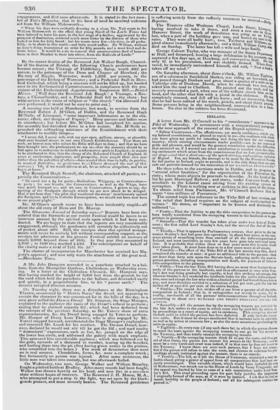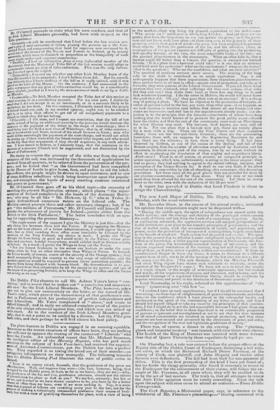IRELAND.
A letter from Mr. O'Connell to his " constituents " appears in the Pilot of Wednesday. It commences with a congratulatory paragraph on the near approach of the renewal of the Repeal agitation- " Fellow Countrymen—The affectionate, yet mauly confidence, which yeti, my beloved constituents, are pleased to repose in me—the readiness with which you have given me credit fur intending and doing the best for our common country, which existing circumstances render possible—are to me snmees of pride and pleasure, and would be the greatest consolation under the difficultia that surround us, if I wanted any other satisfaction or comfort than the cheer. ing excitement which arises from the consciousness that we have arrisedwithin one stage—mud that a short one—of the spirit-stirring, soul-exalting, ogibition of Repeal. Yes, may friends, the attempt to be made by the Precursor Society for full justice to Ireland, ought to precede, and is the only thing that can pre. cede our patriotic demand for the restoration of our NATIONAL LEGISLATURE."
He then refers to the exertions made in Dublin, and in progress is "several other localities," for the organization of the Precursor So. ciety ; whose main objects lie proceeds to describe. At the head of the list he puts Municipal Reform ; and states, under fourteen heads, the mischief's to the Liberal cause arising from the existing system of corruption. There is nothing new or striking in this part of the letter. To obtain relief from Parliament, Mr. O'Connell declares that he wants "two millions of Precursors."
The second topic has reference to the Tithe Bill of last session, and "the relief that Ireland requires on the subject of ecclesiastical a- venues." He states, as "important to be known and distinctly re. collected "-
" Firstly—That the liability to pay the tithe composition to the personate been totally transferred from the occupying tenants to the landlords or to pro. prietors in possession. " Secondly—That this transfer has taken place under two Acts of Portia. went ; the first called Lord Stanley's Act, and the second the Act of the last session.
" Thirdly—That it appears by Parliamentary returns, that prior to the hit session Stanley's Act had gone into operation, in about four years, to the ease. mous extent of something more than one.half of all the tithe-compositions of Ireland, and must inevitably in very few years have gone into universal open• tion. It is probable that within three or four years more this transfer would have taken place. It must have done so in a few years more at all events. " Fourthly—The effect of the Tithe Bill of the last session was this, that it completed the transfer at once : it gave no additional title to the parsons: there are more than forty acts upon the Statute-book, enforcing under the most gorous penalties, including transportation and death, the payment of tithes or tithe.composition to the parsons. " Fifthly—That the last Tithe Bill having done no more than limited the re wady of the parsons to the landlords, and thus effectuated at once what Stan- ley's Act was doing gradually but rapidly, it had this striking advantage, that whereas Stanley's Act rendered the landlords liable for the entire tithe•compose don, save and except the few who within a limited period had bound themselves to pay, and were therefore entitled to a reduction of 151. per cent., yet the late Act strikes off at once 231. per cent. of the entire burden. 4, Sixthly—The recent Act strikes off at one blow a quarter of all the tithe• composition in Ireland ; that is, it extinguishes not merely in name, but is reality, one-fourth of all the parsons' tithe.compositions throughout Ireland, amounting to about ONE HUNDRED AND THIRTY THOUSAND roexus PER ANNUM.
" Seventhly—All the arrears due by the occupying tenants are remitted by the late Act, unless in the cases in which some suit by civil bill, by action, or by proceedings in a court of equity, are in existence. This exception dues not include suits in which the parson has been defeated. It only includes EXIST- ING suits. But it must be always recollected that it includes suits by civil bill, as well as by action at common law; as also the more monstrous proceedings by suits in equity. " Eighthly—In every case (if any such there be) in which the parson chooses to remit the costs against the occupying tenants, he can go for his arrears to the Treasury, and thus totally exempt the occupying tenants. " Ninthly—If the occupying tenants think fit to pay the costs, and thus get rid of that claim, the parson can recover his arrears at the Treasury; and he must be a very harsh and cruel man indeed, if in that case be does not rtsort to the Treasury. I know there are some such parsons, but I hope not many; but if the parson will refuse to take the costs, and chooses to continue Ins pro• ceediogs already instituted against the tenants, there is no remedy. " Tenthly—The bill, as it left the House of Commons, contained a very re luable clause giving a power of appeal from all compositions that bad been on• justly overcharged. This valuable clause, which would have included the case of Rathcormac, was struck out in the House of Lords by Vesey Fitzgerald; and the appeal was limited by him to cases of a sole commission under Lord Sere ley's Act. This cruel proceeding upon his part fully justifies the impresses I originally formed of the man, as if it were by instinct. I felt that be bad an innate hostility to the people of Ireland; and all his subsequent conduct has proved it." O'Connell proceeds to state what his own conduct, and that of 101,i,b Liberal :Members generally, had been with respect to the DO question-- e bly—li will be recollected that I .had before the last session pro- ...„,i'Uevpint of total extinction of tithes, placing the permute up n the OM. ;'nit and compensating that fund for expenses now sustained by it, income of the Woci.ls and Forests in Ireland, as by county 1:111rdelltrout Fund,
the
to donnish in proportion as the tranquillity of each ts, which were night render such expenses unnecessary. oneelyinie— /hd an intimation from a very influential member of the Gorernment, that the Minietetial Tithe Bill of the last session would adopt to aliderable extent my plan of tithe extinction. This was Me only intima- 16 Ir eceived upon the subject.
itteenthl whether any other Irish Member knew of the Thr— I cannot say
lehe Bill intent ed to he proposed ; I don't believe there did. But fur myself, y distinctly that I knew nothing of the bill as it really existed, until it was -11.j the table of the House. On the contrary, I had announced in the ri4lb7,e nOttespaperjustifieds my plan of tithe extinction nould be, a considerable wee, adopted, as I was by the announcement made toot e by a Cubi- st, Minister.
Fourteenthly—No Irish Member accepted the Tithe Act of this session as
owl measure, or as a satisfactory measure. For tiny own part, I distinctly ow that I did not accept it as an instalment, or as a measure likely to be
stisfactory, far In final. On the contrary, I distinctly stated that the people el Ireland would not, and, in my decided opinion, ought not, to be satisfied with it, of to relax their efforts to get rid of all compulsory payments to a Church to which they did not belong.
"Fifteenthly—I did state, and l repeat my conviction, that the bill of last Notion, instead of being an additional security to the parsons, would increase the resistance to the payment of the tithes in the shape of rent-charge; that it wield bring into the field a new class of Whiteboys—that is, of tithe-resisters ; nen in Mead-cloth and boom, instead of the small farmers iu frieze ; men who would dislike exceedingly the payment of the rent-charge, and would not relish the mixing up of their rents with the blood-stained tithe impost, and who would teethe day that they acquiesced, if they should acquiesce, in any such admix- are, I have reason to believe, as I sincerely hope, that the resistance to the payment of a sinecure Church will be augmented, and not diminished by the late let of Parliament."
His desire to remove the pressure of the tithe war from the actual occupiers of the soil, was increased by the thousands of applications he received from all quarters, to be relieved from the persecution of the par- sons; and he feared that " us the Government had been compelled by the House of Lords to give horse, foot, and police to aid the rebel- kon.ruffians, the people might be driven to open resistance, and to one ef those driftless rebellions which bring destruction upon the popula- tion, and strengthen the hands of every crawling creature connected with power or government." Mr. O'Connell then goes off to his third topic—the necessity of unending the present Registration system ; • which places " the repre- sentation of Ireland completely in the hands of the Assistant Barris- Sere," who may be all like " Mr. Hickson, Q. C." who at Tralee il- legally disfranchised numerous voters on the Liberal side. The Ministry cannot procure these and other necessary changes ; but, if he gets "two millions of Precursors," Mr. O'Connell will himself "un- dertake the atteinment of justice for Ireland—justice either from the British or the Irish Parliament." The letter concludes with an apo- logy for supporting the present Ministry— "The single secret of the support I give the Ministry is just this—that the silly choice lies between Meng and the Tories. If my opposing the lUinietry pve or the least chance of a better Administration, I would oppose theni at me; but as their receding from office must inevitably be followed by the secession of the Tory Cabinet, my choice is made. I prefer the Whigs (though for font being as good as I could wish) to the Tories; prin- ciples sail conduct, hateful everywhere, would exhibit itself in atanic cruelty in Ireland. In a word—I prefer the Whigs to keep out the Tories.
"Nut one honest Irishman iu his senses can hesitate to make the same
choice, when he has no other alternative than Whigs or Tories. In Ireland, the Tories would, of course, renew all the atrocity of the Orange system ; they would necessarily drive the country to the very verge of rebellion; and the greatest exertions would be required to prevent (were prevention possible) the lemony from being deluged with human blood. My determination is to pre- servo Ireland from that catastrophe by all the means in my potter; and one of the means of so preserving Ireland, is to keep office the Whigs in offi and the 'fories eat as long as we can."



























 Previous page
Previous page